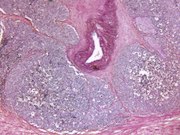No improvement in overall survival; no difference in cumulative rate of distant metastases
FRIDAY, March 16, 2018 (HealthDay News) — Dose escalation from 70.2 to 79.2 Gy is not associated with improved overall survival (OS) in intermediate-risk prostate cancer, according to a study published online March 15 in JAMA Oncology.
Jeff M. Michalski, M.D., from Washington University in St. Louis, and colleagues randomized 1,532 men with stage cT1b to T2b, Gleason score 2 to 6, and prostate-specific antigen (PSA) level of ≥10 and <20 or Gleason score of 7 and PSA <15 to 79.2 Gy radiation therapy in 44 fractions or 70.2 Gy in 39 fractions.
The researchers observed no difference in OS for the 751 men in the 79.2-Gy arm and the 748 men in the 70.2-Gy arm, with a median follow-up of 8.4 years. The eight-year rates of OS were 76 and 75 percent with 79.2 and 70.2 Gy, respectively (hazard ratio, 1.00; 95 percent confidence interval, 0.83 to 1.20; P = 0.98). The eight-year cumulative rates of distant metastases were 4 and 6 percent for the 79.2- and 70.2-Gy arms, respectively (hazard ratio, 0.65; 95 percent confidence interval, 0.42 to 1.01; P = 0.05). The ASTRO and Phoenix biochemical failure rates at five and eight years were significantly higher with 70.2 than 79.2 Gy. The rate of salvage therapy use was lower in the high-dose arm.
“Despite improvements in biochemical failure and distant metastases, dose escalation did not improve OS,” the authors write.
Several authors disclosed financial ties to the pharmaceutical industry.
Copyright © 2018 HealthDay. All rights reserved.








